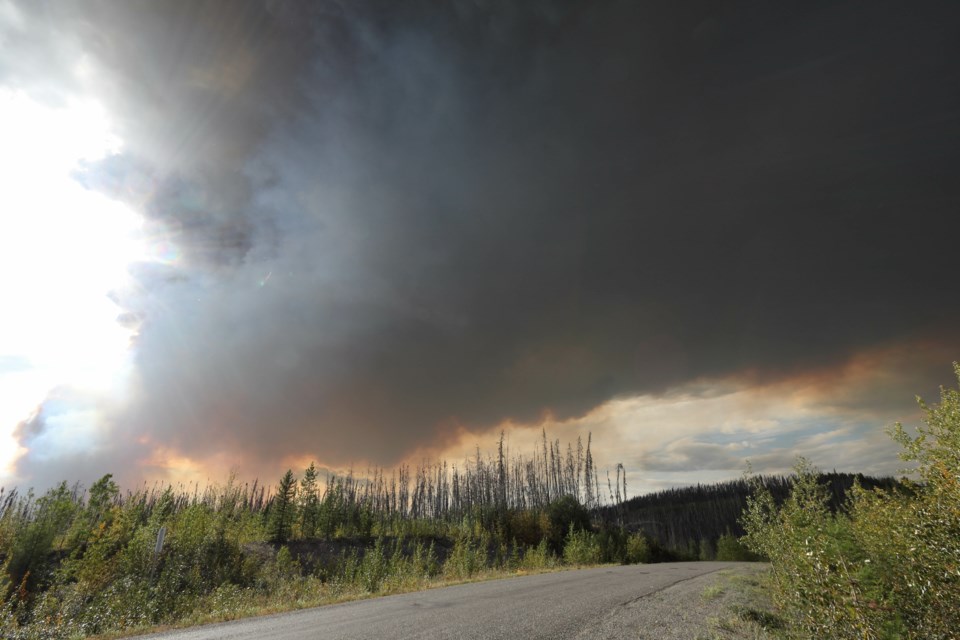As of May 15, with another +10 C spring temperature anomaly underway in northern Alberta, the province’s Wildfire Status Dashboard was showing 87 active wildfires—25 listed as out of control—of the 467 sparked to life so far in 2023. That basically means from April until now.
That’s a lot of fires in a month. Especially when the suspected cause of only a handful are lightning, with ~220 known to be caused by humans. Applying basic math for the 200-plus still “under investigation,” it’s easy to conclude these will mostly be attributed to humans as well. Given the hot, dry, climate-exacerbated conditions under which these fires are occurring, it’s clear that folks in the region have been playing with fire—both literally and figuratively. More so given that the industrial base of northern Alberta is given over to mining a substance (bitumen) that, when converted by fire to a burnable energy form (oil), contributes to the very conditions now causing so much environmental and property damage.
Oh, and speaking of combustion, how about Alberta’s premier Danielle Smith? A political dumpster fire of comedic proportions—one whose personal vendettas and Libertarian leanings saw her fail to reach out or coordinate with the feds to deal with the fires in a timely manner, bizarrely delay evacuation orders, preferentially inform United Conservative Party supporters of the impending provincial emergency she would declare, mismanage emergency funds already reduced by UCP austerity, and mire herself in rhetorical controversies via leaked videos on everything from criminal street preachers to likening Albertans who followed COVID mandates to Nazis.
Amazingly, all this populated the news in the same week, and adds up to a disquieting optic: a premier who clearly values the loyalty of her base over the safety of Albertans. If such cravenly political behaviour seems reckless for a so-called leader charged with communicating effectively during what is proving to be a serious crisis, well, it is.
In an odd turn of events, Alberta’s NDP leader, Rachel Notley, can’t be cut any slack here either. Alberta’s wildfire disaster is playing out on what amounts to an eggshell stage, with the emergency declared just after the writ was dropped for a provincial election that’s basically a cage match between Smith and Notley.
With both candidates loathe to crack any eggs less they rankle key voting constituencies, both are playing it cool while sitting on the hot seat. As Emma Jackson outlines in The Breach, “while there couldn’t be a better moment to reckon with the roots of this emergency, neither political party has shown the courage to address, or even to name, the crises fuelling the fires: austerity and climate change.”
On the austerity front, the effect of UCP budgeting on Alberta’s firefighting capacity is a matter of public record: according to Alberta’s own estimates, $130 million was allocated for wildfire management in 2018-19; the following year this dropped to $117.6 m, including cuts to the staffing budget for lookout towers and scrapping of the bargain-bin $1.4-m Aerial Rapattack fire service team (used effectively about 100 times that year). By 2022-23, with Smith at the helm, that line item had dropped to $100.5 m—an overall $30-m reduction against rising inflation.
Clearly, fingering this budget-slashing is a no-go for Smith, but also a risk for Notley, who hopes to woo centrist conservative voters horrified by Smith’s outbursts. And so, in Alberta, Nero’s past, present and future fiddle while Rome burns.
The play is almost identical with the climate-change card. It’s well-known that the most dangerous time for fire in the boreal forest is during the so-called “spring dip”—the time between snowmelt and leaf-out when a combination of drought, high temperature and low humidity can make the forest floor ignitable by a glint of sun off a belt buckle. And, of course, Albertans have been here before: John Vaillant’s excellent new book, Fire Weather (he’ll be at the Whistler Writer’s Fest this fall discussing it) goes into great detail on the conditions behind todays conflagrations, as well as the wildfires that destroyed most of Slave Lake in 2011 and Fort McMurray in 2016, the latter displacing almost 90,000 people. Bad decisions were made with Slave Lake; worse decisions with Fort Mac. It’s too soon to say how today’s dictates will rank.
Smith, of course, won’t touch climate. And for those who think honesty might be the best policy for Notley on such a clear NDP policy point, recall Green Party leader Elizabeth May’s instant excoriation in the press when, with the ashes of Fort Mac still smouldering, she answered frankly when asked if she thought climate change had played any role in the fire: “Of course.” She then spent weeks clarifying to a Luddite public that she didn’t mean this specific event, per se, but the cumulative atmospheric conditions making it more likely to happen—and to be so much worse. This was both honest and incontrovertible, as climate attribution scientists soon showed (climatesignals.org/events/fort-mcmurray-fire-2016).
And yet, despite this history, today we again see communities destroyed, fist-shaking town halls, and tens of thousands displaced as two rival politicians appear together at a news conference ostensibly in support of beleaguered Albertans, while both secretly play three-way chicken with each other and the truth hoping to make it to election day without having to honestly address what amounts to a recurrent major disaster. One of them is a lightning rod for climate deniers, the other handcuffed by politics from articulating her party’s vision to tackle this evolving hellscape.
This is where politics has seemingly brought us in Canada—a Theatre of the Absurd in which we can only watch and empathize as our fellow citizens get burned, again.
Leslie Anthony is a biologist, writer and author of several popular books on environmental science.






